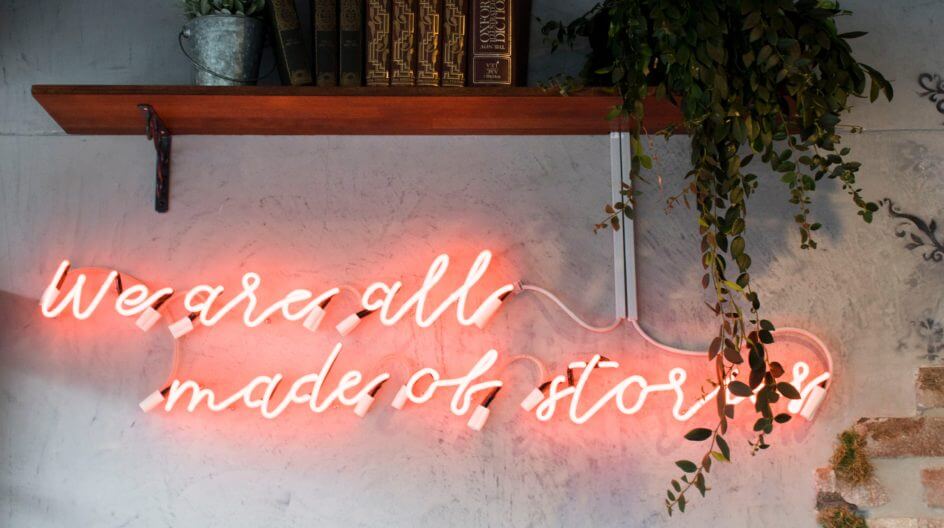“Our origin stories don’t get to define us.” – Dr. Janina Scarlet
Storytelling is one of humanity’s greatest gifts. It is a skill we have been perfecting for thousands of generations across the globe long before anyone started writing stories for others to read.
In fact, it is almost impossible to separate storytelling from anything we do.
Some of the more obvious examples can be found in art.
A musician tells a story through the composition of her songs. A poet tells stories through the words and structure of his poems. A beautiful painting tells a story just as much as an “ugly” painting does. Even children can regale you with the epic tales underlying their scribbling and stick figure drawings.
Science might not be something a person thinks of when it comes to storytelling. However, the pursuit of truth through science can be viewed as the constant writing and rewriting of the story of this universe. Every new discovery is a new chapter in the book of humanity’s endeavor to understand the world around us.
But storytelling has another facet many of us never think about.
You are telling yourself a story about yourself every time you do something.
And every time something happens to you.
When I walk out of a job interview, I might tell myself it went great because I conveyed my skillset with a great example from my last job (and that would be a story, too). A few days might go by without hearing anything so I change my mind and think the interview was terrible because of all the awkward silences. Then I rethink the example I used and realize I should have used a different one. But then I open my inbox a week later and see an offer letter so I tell myself another story about how the interview went great!
Where was the real story in that mess? And how much time did I waste by overanalyzing something I can’t even change? How much stress did I cause myself due to something I no longer had control over?
That same idea can be applied to a romantic date. How many dates have you gone on with someone you had a crush on and thought, “Damn, that was terrible” only to get a call back the next day wanting to see you again?
We tell ourselves stories all the time.
Grabbing something out of the fridge? Your decision to grab something healthy might result in you continuing to tell the story of you being healthy. Or your decision to grab junk food might result in you telling yourself the story that you’ve been eating healthy and you deserve a treat.
Why do we do it though?
“To be able to build our own narratives through symbolism, rituals, and tradition allows us to thrive in a world where the odds are stacked against us.” – Johnny Dzubak
It’s easier for us to go about our lives if we can make sense of what happens to us. Sometimes that means fabricating reasons or putting more weight on specifics (like the interview example). In many cases, the story we tell ourselves is simply a result of not being aware of all of the information.
Unfortunately, there’s no way to know everything about every decision we make and everything that happens to us. Telling a story to rationalize an event or decision makes it easy to move forward. This way we don’t get stuck in a loop trying to make perfect sense of every experience.
But once you can recognize you’re telling yourself a story, you also have the power to change it.
You can write your own story.
Did you just walk out of an interview with a company you want to work for? Assume it went great and the company would be lucky to hire you. Identify 2 or 3 moments you could have done better and knock them out of the park in another interview.
Did you just get home from a date with someone you’re crushing on? Assume it went great and let the other person know you want to go on another. If you don’t hear back, try one more time and then move on.
In either case, you assume the best, learn from the experience, and move forward. If you don’t hear back, so be it, you know your value and someone will eventually recognize it if you keep putting yourself out there.
We cannot change the past. We can only use it to better prepare for the future.
On our podcast episode this week, Dr. Janina Scarlet, developer of Superhero Therapy, describes one powerful storytelling exercise:
Imagine that what you’re going through right now, what you are struggling with as you go after your goals, gets turned into a movie one day. Imagine millions of people watch this blockbuster in the cinema with friends or with a date.
Now ask yourself: when they come out of the cinema two hours later, what will they say that the movie was about?
Not “What happened?”, but “What did the main protagonist (that’s you!) stand for?”
And as you go through your struggle, as you pursue this goal, remember: what ultimately happens might not be all up to you in the end. But what you are going to stand for, and how you are going to behave – that can be completely in line with your own superhero story.
To find out more about how stories can better help you understand yourself and grow, check out our latest podcast with Dr. Janina Scarlet in which she discusses her fascinating approach to therapy through the use of superhero stories.



